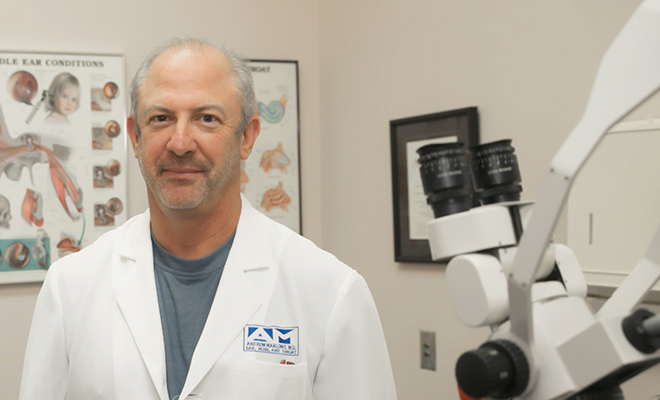
Health & Wellness
In HEALTH
By Dr. Andrew Marlowe
A Guide to Hearing Aids
Dr. Marlowe is board certified in Otolaryngology-Head and Neck Surgery and has completed fellowship training in Craniofacial/Skullbase surgery and Otology/Neurotology. hearing
When we start to lose our hearing, it can be traumatic. There are so many questions that come to mind, all of which I have answered throughout my many years of evaluating my patients’ hearing loss issues and providing them with the best possible outcome – whether it be surgery, hearing aids or implantable devices. In order to help you navigate through the many questions you may have, here’s my guide to hearing loss and hearing aids.
What should you look for in the purchase of a hearing aid?
Today more than ever there is a lot of confusion in the process. Every corner in our town seems to have a hearing aid dispensary. We have more places to get a hearing aid than we have fast food restaurants. There is a deluge of advertising. Everyone makes claims of incredible technology and has “special offers.” How are you to feel comfortable enough to make a decision to pursue hearing improvement? Here is my best advice based on my knowledge as a board-certified Ear, Nose and Throat physician serving this community for nearly 12 years, as a fellowship-trained ear surgeon, and as an electrical engineer.
Most importantly, you want to buy from a physician-directed facility – preferably from an otolaryngologist (ear, nose and throat specialist) with a particular interest in hearing care. It should not cost any more to avail yourself of this expertise. Consumer Reports’ most recent article on the subject in July 2009 makes this same recommendation. Using hearing aids sometimes means that you have increased medical needs for your ears, such as removal of wax, treatment of skin conditions in the ear and monitoring of your remaining hearing. Nobody is more qualified to do that than the otolaryngologist. There are times when a hearing aid patient experiences a sudden change in their hearing. It may be difficult for the patient to determine if the problem is related to the hearing aid or the ear. If the ear doctor dispenses the device both issues can be addressed in the same place at the same time. Lastly, the physician is more likely to remain in business, and not close or move his practice. The physician is putting a hard-earned medical reputation on the line with each sale, and this gives added incentive to give the best care possible.
What happens if I wait until my hearing gets worse?
The people who struggle the most to regain hearing are the ones who waited. The reason is that hearing loss leads to lack of brain stimulation…the tones you don’t hear are forgotten. The longer you have the loss without correcting it, the worse it gets and the harder it is to rehabilitate. The people who do the best are people who start early and keep up with their loss as it progresses (almost all hearing deteriorates as we age).
Is my hearing bad enough that I need two hearing aids?
The need for two hearing aids has nothing to do with how severe the loss is. The brain is wired to hear from both ears and uses the “stereo” information to help localize sound and hear in background noise. There are really only two conditions were it is correct to fit one hearing aid: 1) one ear has normal hearing, or 2) one ear has hearing loss so severe that it is not treatable.
Why do I know people who have hearing aids and are very dissatisfied?
There are many reasons for this situation. The obvious one is that in general people who do well with their aids don’t really talk about them… they just wear them and find better topics of conversation. Not all hearing aids work well, and even well-made hearing aids can be fit poorly. Consumer reports found that people are fit incorrectly about 60% of the time. Additionally, many people are basing their hearing aid experience on old, outdated technology. Hearing aids that are more than 3-4 years old may be “antiques” – which is fine for cars and furniture, but not for computers and certainly not for hearing aids.
In summary:
Don’t “wait until it gets worse.”
Seek the highest level of expertise. It doesn’t cost more and may save you from a costly mistake.
Don’t base your decision on other people’s situation or old information.
The state of the art of hearing restoration has never been better.
Marlowe & Marrs Ear, Nose and Throat, 5432 Bee Ridge Road, Ste. 150, Sarasota, FL 34233
941.379.3277, marlowemd.com
Was this article helpful? You may also be interested in this.



You must be logged in to post a comment Login